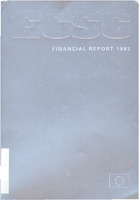| dc.contributor.author | Commision of the European Communities |
| dc.date.accessioned | 2020-06-21T13:42:06Z |
| dc.date.available | 2020-06-21T13:42:06Z |
| dc.date.issued | 1994 |
| dc.identifier.isbn | 92-826-8255- |
| dc.identifier.uri | https://ketlib.lib.unipi.gr/xmlui/handle/ket/2460 |
| dc.description | Sections are bookmarked. |
| dc.description | http://aei.pitt.edu/id/eprint/35826 |
| dc.description.abstract | Economic background and developments in ECSC industries General economic situation In 1993, the recession pursued 1ts course and unemployment rates con-tinued to rise in most Member States. At the same t1me, there was consid-erable nse 1n budget deficits. Econom1c growth, which had been + 1% 1n 1992, fell to -0.4% 1n real terms 1n 1993: the f1rst negat1ve growth rate since 1975. Th1s poor perform-ance was due to the general slow-down in world econom1c activity. In the Community, the recession started relatively late owing to German unifica-tion, wh1ch boosted demand 1n Germany and hence 1n Europe as a whole. Other factors adversely affected econom1c activity and bus1ness and con-sumer confidence, 1n particular diff1cult1es with the rat1f1cat1on of the Treaty on European Un1on, turmoil on the fore1gn exchange markets and disagree-ments at the GATT negotiations. These negative Influences comb1ned with the economic slow-down to cause a continuing declme 1n investment and a drop 1n exports |
| dc.format.extent | 102p. |
| dc.language.iso | en |
| dc.publisher | Office for Official Publications of the European Communities |
| dc.subject | Economic and Financial Affairs |
| dc.subject | Financing of Research |
| dc.subject | Budgets and Financing |
| dc.title | ECSC financial report 1993 |
| dc.type | working document |
| dc.publisher.place | Brussels |

